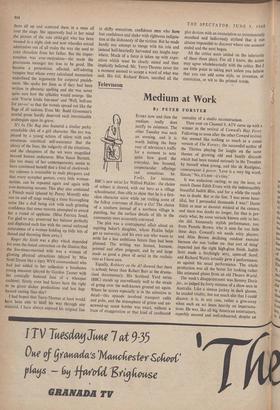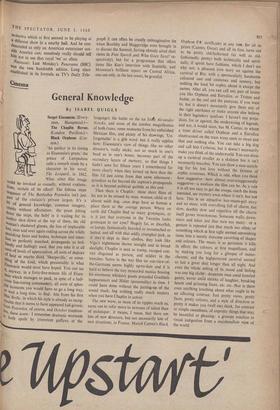Television
Medium at Work
By PETER FORSTER Eviav now and then the medium really does justify its existence. The other Tuesday was such an evening, and it is worth halting the busy roar of television's traffic for a moment to note quite how good the everyday, less boosted, unspectacular offerings can sometimes be. Yorky, for instance, BBC's new serial for Wilfred Pickles: the choice of subject is shrewd, with our hero as a village schoolmaster, thus able to show that he is a first- class character actor while yet trailing some of the folksy overtones of Have a Go! The choice of a southern instead of a northern village is puzzling, but the surface details of life in the community were accurately conveyed.
The plot was a contrapuntal affair about an aspiring baker's daughter, whom Pickles helps get to university, and his own son who wants to settle for a less ambitious future than had been planned. The writing was human, humane, pointed and often poignant, and by and large made as good a piece of serial in the realistic vein as I have seen.
Equally, Robbery on the AS showed that there is nobody better than Robert Barr at the drama- tised documentary. His Scotland Yard series (BBC) stands up marvellously well to the strain of going over the well-known ground yet again. Where he scores especially is in the attention to detail—this episode involved transport cafés and pubs, and the atmosphere of grime and un- screwed-up sauce bottles was exact, without a trace of exaggeration or that kind of cardboard unreality of a studio reconstruction.
Then over on Channel 9, ATV came up with a winner in the revival of Coward's Hay Fever. Following so soon after the other Coward revival, this seemed like nothing so much as a comic version of The Vortex: the successful author of the Thirties playing for laughs on the same themes of growing old and family discords which had been treated seriously in the Twenties by himself when young, and like de Rastignac, commenOnt d percer. 'Love is a very big word. Simon."No, it's not—it's tiny.'
It was audacious casting, to say the least, to match Dame Edith Evans with the indestructibly beautiful Judith Bliss, and for a while the result was in doubt. But at the line, 'I was never beau- tiful, but I persuaded thousands I was!' Dame Edith as near as dammit winked at the camera, and there was doubt no longer, for that is pre- cisely what, by some miracle known only to her, she did. Immensely stylish performance, too, from Pamela Brown, who is seen far too little these days. Coward's wit needs witty players, and Miss Brown declining outdoor exercise because she was 'rather un- that sort of thing' imparted just the right high-gloss finish. Judith Stott made a fetchingly sexy, sawn-off Sorel, and Richard Wattis actually gave a performance, as against his usual performance. The whole production was all the better for looking rather like animated plates from an old Theatre World.
The week's disappointment was Sammy Davis jnr., as judged by forty minutes of a show seen in Australia. Like a simian jockey in dark glasses, he exuded vitality, but not much else that I could discern; it is, in any case, rather a give-away when such an act leans heavily on impersona- tions. He was, like all big American entertainers, superbly assured and well-rehearsed, despite an orchestra which at first seemed to be playing at a different show in a nearby hall. And he con- descended as only an American entertainer out- side America can; somebody really should tell him not to use that royal `we' so often.
Footnote: Last Monday's Panorama (BBC) Was the two hundredth edition. Long since established in its formula as TV's Daily Tele- graph it can often be crassly unimaginative (as when Boothby and Muggeridge were brought in to discuss the Summit, having already aired their views in Free Speech and Who Goes Next? re- spectively), but for a programme that offers items like Kee's interview with Soustelle, and Mossman's brilliant report on Central Africa, one can only, in the last resort, be grateful.



































 Previous page
Previous page